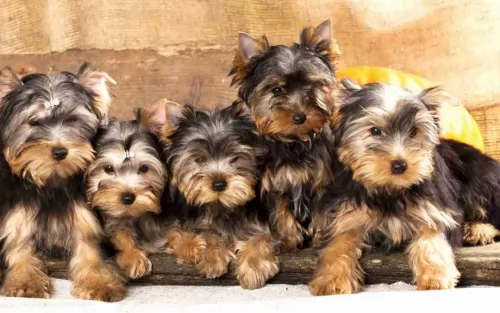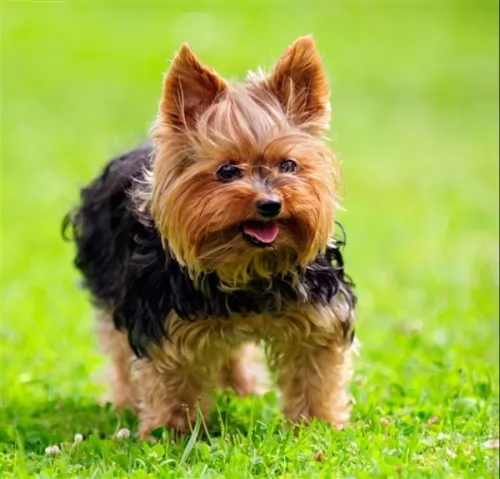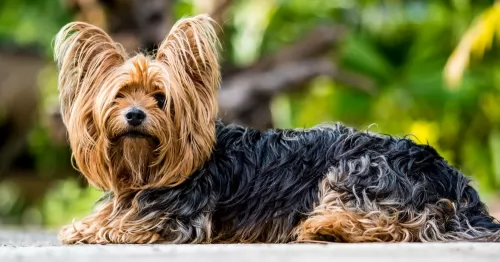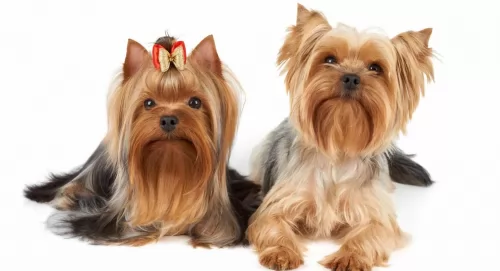 Petzlover
Petzlover Yorkshire Terrier is originated from United Kingdom but Australian Terrier is originated from Australia. Both Yorkshire Terrier and Australian Terrier are having almost same height. Both Yorkshire Terrier and Australian Terrier are having almost same weight. Both Yorkshire Terrier and Australian Terrier has same life span. Both Yorkshire Terrier and Australian Terrier has almost same litter size. Yorkshire Terrier requires High Maintenance. But Australian Terrier requires Moderate Maintenance
Yorkshire Terrier is originated from United Kingdom but Australian Terrier is originated from Australia. Both Yorkshire Terrier and Australian Terrier are having almost same height. Both Yorkshire Terrier and Australian Terrier are having almost same weight. Both Yorkshire Terrier and Australian Terrier has same life span. Both Yorkshire Terrier and Australian Terrier has almost same litter size. Yorkshire Terrier requires High Maintenance. But Australian Terrier requires Moderate Maintenance
 The Yorkshire terrier originated in Yorkshire which is a place in northern England. In mid 19th century workers from Scotland came to Yorkshire in search for work. They brought different varieties of small terriers with them. Earlier they are known as Broken Haired Scotch Terrier and then Toy Terrier. In 1874 they were officially named as Yorkshire Terrier. They begun their journey as hunting dogs and later developed as companion dogs. AKC registered the breed in 1878.
The Yorkshire terrier originated in Yorkshire which is a place in northern England. In mid 19th century workers from Scotland came to Yorkshire in search for work. They brought different varieties of small terriers with them. Earlier they are known as Broken Haired Scotch Terrier and then Toy Terrier. In 1874 they were officially named as Yorkshire Terrier. They begun their journey as hunting dogs and later developed as companion dogs. AKC registered the breed in 1878.
 The Australian terrier, the little terrier, is a breed developed to control vermin. The nature of this dog is very spirited. They are alert, courageous and self-confident but still very human-friendly.
The Australian terrier, the little terrier, is a breed developed to control vermin. The nature of this dog is very spirited. They are alert, courageous and self-confident but still very human-friendly.
Australian terriers were breed by the mix of the Terrier with the rough coat and Scotch Dog of Great Britain. These breeds were mixed until they produced the muscular and fearless dog for the Australian settlers. Their primary job was to control the number of rodents and snakes. They were taught to tend flocks, be an excellent guard dogs but remain friendly. This breed is still very popular as a working dog, loyal companion and dogs for show, city, home or a farm.
 Yorkshire terriers are one of the glamorous member of the dog breeds. They have excellent personality as their owner will be surely proud of them when taking them in public. They like to go outside and make adventures. They are good companion dogs and watch dogs too. They are very affectionate with their owners. Yorkies always bark when any stranger comes and they should be taught about neighbours and when to bark. They will get angry on seeing new dogs and surely chases squirrels.
Yorkshire terriers are one of the glamorous member of the dog breeds. They have excellent personality as their owner will be surely proud of them when taking them in public. They like to go outside and make adventures. They are good companion dogs and watch dogs too. They are very affectionate with their owners. Yorkies always bark when any stranger comes and they should be taught about neighbours and when to bark. They will get angry on seeing new dogs and surely chases squirrels.
They like to spend more time with their people. Leaving them alone for long time is not good. Yorkshire terrier should be treated gently and with love. They love to spend time with older children. They love apartment life if they are made to play and walk daily. Yorkies are the second most popular dog in America.
 The Australian terrier has body longer than they are tall. They are small dogs with the long and thick coat with silky undercoat and short little legs. This smart-eyes breed is perfect for persons who live indoors. But, you must know that they really like to bark and communicate that way with everybody. They also have a high need for activity so it will be necessary to take him out so he can run, play and be social with other dogs. They are very intelligent, but not very responsive. They will quickly learn how to fetch, but they will have days when they just feel like fetching.
The Australian terrier has body longer than they are tall. They are small dogs with the long and thick coat with silky undercoat and short little legs. This smart-eyes breed is perfect for persons who live indoors. But, you must know that they really like to bark and communicate that way with everybody. They also have a high need for activity so it will be necessary to take him out so he can run, play and be social with other dogs. They are very intelligent, but not very responsive. They will quickly learn how to fetch, but they will have days when they just feel like fetching.
 Yorkshire terrier are not so much friendly with children. It is not advised to leave them with children without adult supervision.
Yorkshire terrier are not so much friendly with children. It is not advised to leave them with children without adult supervision.
They were previously used to catch rats and hunt badger and fox. They are excellent watchdogs and defend their territory very well.
They adapts well for apartment living. But they will not be happy if leaved alone for a long time. Yorkies cannot tolerate too hot or cold weather.
They are moderately easy to train. Yorkshire terrier should be trained early when they are amenable to process. Sessions should be conducted with lots of treats and must be short as they will easily get bored.
 The Australian terrier is very good breed to choose if you have children. They are active and always ready to play, and they will protect the children since they have watchdog gene.
The Australian terrier is very good breed to choose if you have children. They are active and always ready to play, and they will protect the children since they have watchdog gene.
Excellent watch dog. This breed will keep your garden and home vermin free.
They are generally very polite towards strangers and highly adaptable among other dogs, but their adaptability in social life is totally up to the human and the training. They can grow to be adaptable dogs that fit well into almost any environment; city or country, house or apartment.
Since they are an intelligent breed, the Australian terrier may surprise you with their ability to learn new tricks and shock you with their ability to be very strong willed about doing what is told. It’s not that they are not the type to obey and be “a good dog”, they are so playful and silly that they will often forget that they are the god and not the human. You must start training them while they are still pups.
 A bone disorder, where the hip joint starts to rot caused by decaying of the femur bone which is located in the dog’s hind limb.
A bone disorder, where the hip joint starts to rot caused by decaying of the femur bone which is located in the dog’s hind limb.
Luxating patella is a knee disease where one or both kneecaps can slip out of place.
Rupture of an important ligament in the knee (stifle) joints.
The brain disorder that is characterized by seizures. There are several different types of epilepsy that can affect dogs.
A chronic disease of the metabolism which is characterised as high glucose amount in the blood. This happens when hormone insulin drops below the normal values. This condition results in malfunction of vital organs.
 For English bull dog puppies, When you change the puppy food from liquid to solid initially you must give what the dam is having. This is to avoid digestive problems when new food is introduced. The level of liquid food should be reduced in a step by step manner and thus increasing solid food gradually.
For English bull dog puppies, When you change the puppy food from liquid to solid initially you must give what the dam is having. This is to avoid digestive problems when new food is introduced. The level of liquid food should be reduced in a step by step manner and thus increasing solid food gradually.
You have two choices and one is manufactured dog food and another is home cooked food. Commercial brands are not suggested as they contain artificial coloring and chemical preservatives.
Vaccinations should be made at the right time. The food given should be the best.
Yorkshire terrier should be taught tricks by giving rewards. Exercising them has benefits such as maintaining muscles, release pent-up energy, good for heart, good metabolism, good sleep and be active.
 Recommended daily amount is usually found on the type of the food you choose. They like dry food, and if you are not quite sure what brand of the dry food you should choose, seek a vet’s advice. The Australian terrier has a healthy appetite, but he almost never overeats. How much your Australian terrier eats depends on his size, age, metabolism, and activity level.
Recommended daily amount is usually found on the type of the food you choose. They like dry food, and if you are not quite sure what brand of the dry food you should choose, seek a vet’s advice. The Australian terrier has a healthy appetite, but he almost never overeats. How much your Australian terrier eats depends on his size, age, metabolism, and activity level.
Their coat requires moderate maintenance. That means that you don’t have to groom your Australian terrier every single day, but being aware of the importance of grooming him at least twice a week is a key because lack of adequate care may lead to skin diseases. Make sure not to bathe them too much, but you can be free with their haircut. They can grow very sharp toenails, so they should be clipped regularly. Ear and teeth must be kept clean.
Lots of outdoor activity. They are lovable kind, so don’t be reserved towards them. It’s important to begin training and socializing your pup as soon as possible. Training sessions need to be consistent, firm, short and clear. Grooming is a must since you will want to prevent the tangles and mats.
Find a place for them where you can take of the leash and let them run free. They love chasing birds, butterflies and anything that flies above. They will chase small rodents, other dogs and cats. After you thought you Australian terrier how to play with other dogs and cats, they will be the most wanted guest in the whole neighbourhood. Find a place where they can dig holes – and they will be so happy that they probably won’t hear you calling them home.